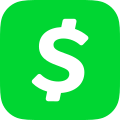2013–2015: Launch, early years
Cash App was launched by Block, Inc. (then named Square, Inc.) on 13 October 2013. [11] [2] It was originally branded as Square Cash. [9] It aimed to help users send money to one another with a debit card via email or text message, regardless of what bank each party used. [12] [7] Block's cofounder Jack Dorsey and Brian Grassadonia contributed to the product creation. [13] [14] Square Cash allowed users to send up to $2,500 a week in several transactions or all at once, and worked only in the U.S. It was meant only for person-to-person money transfers, and not for online or off-line shopping. [7]
In August 2014, Block said that Square Cash users had sent "hundreds of millions of dollars" to one another. [12]
In March 2015, Square introduced Square Cash for businesses. This allowed individuals, organizations, and business owners to create a unique username to send and receive money, known as a $cashtag. [8]
2016–2020: Feature additions
In September 2016, Cash App announced a guarantee of "instant deposit" for the money received via Cash App, if the user agreed to pay a 1% fee. Users would otherwise see deposits post to their Cash App account on the next business day. Block also introduced virtual payment cards that allow Cash App users to make purchases on websites and apps using money stored in the app. [15]
In January 2018, Cash App added support for bitcoin trading. [16] [17]
In October 2019, Cash App added support for stock trading to users in the United States. [18]
In November 2020, Square announced it was acquiring Credit Karma Tax, a free do-it-yourself tax-filing service, for $50 million and would make it a part of its Cash App unit. [19]
2021–present: Growth, U.S. focus
In 2021, Block announced an extension of the Cash App service to people over 13 years old for depositing and spending money or sending it to friends. Minors would not have access to investing or bitcoin features, however, and would still need their parent or guardians’ permission and significant oversight to use the app. [20]
According to a Pew Research Center report in September 2022, Cash App was found to have been used at least once by 26% of U.S. adults. The report also stated that lower-income adults were the most likely to use the app over other payment apps. [10]
In August 2023, Block announced a closure of Cash App's operations in the European Union under the "Verse" brand, citing a lack of growth and profitability in the market. [21] On September 7 and 8, 2023, Cash App experienced a service outage, affecting peer-to-peer payments and cash card purchases for thousands of users. Block stated on September 8 that the service was restored successfully by that day. [22] [23]
In February 2024, the service reported 57 million monthly transacting user accounts, $14.7 billion in revenues and $248 billion in inflows for the year 2023. [6] [24] [25] In June 2024, Block announced it was dropping its plan to launch Cash App in Australia. [26] In the following month, Cash App announced it would cease operations in the United Kingdom on September 15, 2024. [27]
In August 2024, Cash App settled a $15 million class-action settlement for data and security breaches at the service. Users whose accounts were accessed without their authorization or who had fraudulent withdrawals or transfers could file claims for up to $2500, provided they had an account between August 23, 2018, and August 20, 2024. The class-action pointed to a security breach in 2021, and another in 2023. As part of the settlement, Cash App and Block also agreed to take steps toward strengthening data security, while denying any wrongdoing. [28]
In January 2025, Block agreed to pay, as part of a settlement, a fine of $80 million to a group of 48 state financial regulators after the agencies determined the company had insufficient policies for policing money laundering through Cash App. As part of the settlement, the company also agreed to involve an independent consultant to review its Bank Secrecy Act and anti-money laundering program, and report back to the states on any deficiencies. Block stated at the time that the issues were mainly related to Cash App's prior compliance program, and the company has significantly increased investment in compliance and risk management. [24]
In February 2025, Block reported that Cash App had $16.25 billion in annual revenues and $282.9 billion in annual inflows for the year 2024. [1]
